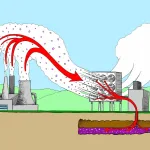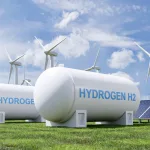Brazil reduces CO2 emissions with more than 40%

Coming Global Leader
eyesonbrasil
Amsterdam, May 2nd 20244– Brazil’s state-run Petrobras oil company announced this week a 41% reduction in carbon dioxide (CO2) emissions between 2015 and 2023 according to the oficial news media and the Agencia Brasil.
‘ The result was exceptional ‘, said Petrobras’ Energy Transition and Sustainability Director Maurício Tolmasquim.

It was also an improvement from last year’s figures when a 39% cutdown was achieved from 2015 to 2022. The oil giant plans to invest US$ 5.5 billion in renewable energy, it was explained.
In an exclusive interview with Agência Brasil, Tolmasquim said the result means that Petrobras produced the same amount of gas and oil while emitting less CO2, even with new platforms coming into operation in 2023. This was also the best performance in the company’s history for reduced emissions.
The publication also reveals that methane emissions—the second of the three gases that aggravate the greenhouse effect—were slashed by 68%.
“This is relevant because, even though CO2 is more abundant, methane has a greater impact on global warming. To give you an idea, over a period of 100 years, one molecule of methane has a warming power 25 times greater than that of CO2. So reducing methane brings a vital benefit to the climate.”
Petrobras has achieved 14.2 kilos of CO2 emitted per barrel of oil when the world average is around 18 kilograms, the Agencia Brasil also pointed out.
Another topic discussed by the director of Energy Transition and Sustainability was the resilience of Petrobras’s oil expansion plan, adding that the International Energy Agency expects to meet a global production target of 57 million barrels per day by 2050. As it stands today, the world consumes 100 million barrels a day. With the energy transition, the trend is for demand to decline.
“Petrobras must gear up for this world with lower demand,” he stated. If this goal is met, global warming would reach 1.7 °C—close to the ideal target of 1.5 °C,“ Tolmasquim went on to argue. ”To be part of this future world, we need to produce oil at a competitive cost, emitting fewer greenhouse gases, he said. “We’re not going to make investments we’re bound to regret in the future. These are investments we believe will be profitable, even in a world that demands less oil.”
In his view, this is an important element for Petrobras’ investors, since it means that the company is being cautious and that its portfolio can adapt to the future.
Tolmasquin also mentioned that in order to reduce its carbon footprint, Petrobras is diversifying its portfolio of products that emit less greenhouse gases. To this end, the 2024–2028 Strategic Plan stipulates investments adding up to some US$ 11.5 billion —of which US$ 5.5 billion is earmarked for investments in renewable sources, or low-carbon energy, including onshore wind farms and biofuels.









